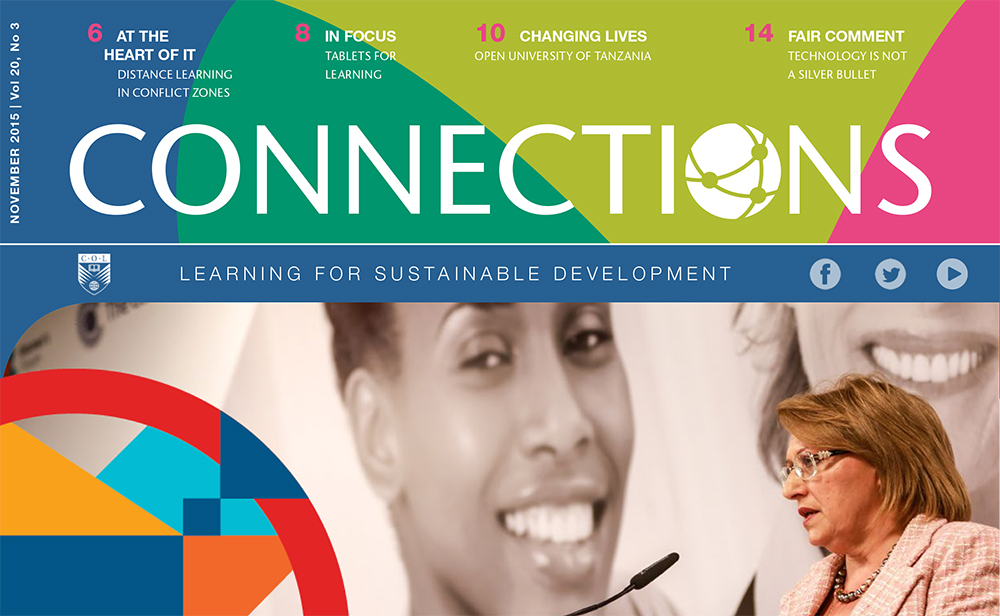
COVER STORY
COL takes learning for sustainable development message to CHOGM
COL representatives worked hard to ensure that education and learning for sustainable development was on the agenda at the 2015 Commonwealth Heads of Government Meeting (CHOGM 2015) 27-29 November in Malta.
“Ending extreme poverty by 2030 has to be more than just a goal, it has to be a reality,” said COL President & CEO Professor Asha Kanwar, referring to the United Nations’ new global Sustainable Development Goals. “Our task is to ask, ‘How can we use distance learning and technology to provide not just formal education, but all forms of learning to achieve all 17 sustainable development goals?'”
The theme for CHOGM 2015 was Adding Global Value. COL representatives used CHOGM meetings and sessions to promote a new COL initiative that will support secondary schooling, training and skills development for hard-to-reach girls and women using open and distance learning. COL also used CHOGM as an opportunity to share details of its 2015-2021 Strategic Plan, Learning for Sustainable Development, and highlight the many ways in which COL’s work achieves global value and impact.
COL representatives presented at seven different sessions throughout the week-long agenda leading up to CHOGM that included a Youth Forum, Business Forum, People’s Forum, and for the first time ever, a Women’s Forum. COL’s presentations focused on education and learning for girls and women, women leaders in sustainable development, human resource development for the blue economy and adding global value.
Photo credit: CHOGM Malta 2015 photo
NEWS
Malta MEDE and COL to collaborate on digital education
COL and the Malta Ministry of Education and Employment have signed an MOU to collaborate on digital education and foster an exchange of ideas between key institutions in the European Union (EU) and the Commonwealth on issues related to education and learning for sustainable development.
The partners will convene a think-tank of global leaders in digital education and develop a robust, sustainable framework for good practice in digital pedagogy. This framework will include pilot systems for the recognition and accreditation of online qualifications with due consideration for quality assurance.
The agreement provides for the establishment of a Commonwealth Centre for Connected Learning based in Malta, and managed as a joint COL/MEDE venture. The Centre will operate as an international hub for action research on digital education, including content, curricula, assessments, new forms of teaching and learning practices and changes to leadership and values.
“This partnership recognises Malta’s unique position in both the EU’s educational framework and as a small Commonwealth state with an advanced system of education and training,” said COL President & CEO Professor Asha Kanwar. “We hope this new centre will serve not only Malta, but the Europe-Africa region of the Commonwealth.”
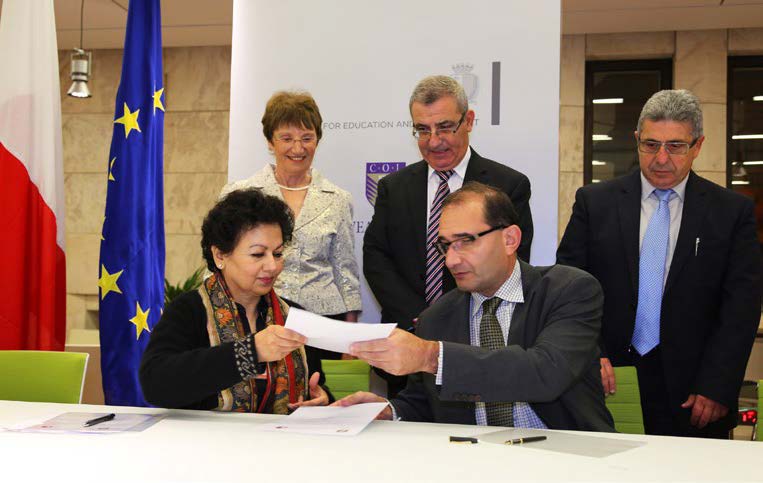
COL President & CEO Professor Asha Kanwar and Joseph Caruana,
Permanent Secretary, MEDE sign a new partnership to support digital education
while COL Chair Dr Linda Sissons, Hon Evarist Bartolo, Minister for Education
and Employment, Malta and George Borg, Director General, MEDE look on.
MIC launches open school at Tobago Technology Centre
A new open school in Tobago will support local students in developing skills that will help them to get jobs and also qualify for higher level technical and vocational courses offered at the MIC Institute of Technology (MIC).
The open school, which will offer Caribbean Secondary Education Certificate (CSEC) courses in Mathematics, Integrated Science and English, was launched by MIC and the Commonwealth of Learning (COL) 13 October 2015.
The open school initiative will play a pivotal role in the transformation of the lives of students who want to develop their skills and enhance their employability. After learning these literacy and numerical skills and competencies, students can matriculate into higher level technical vocational courses offered at MIC.
The open school joins other initiatives of MIC in its mandate to develop Trinidad and Tobago’s workforce. The plan is for the open school concept to be expanded to other MIC centres throughout the country.
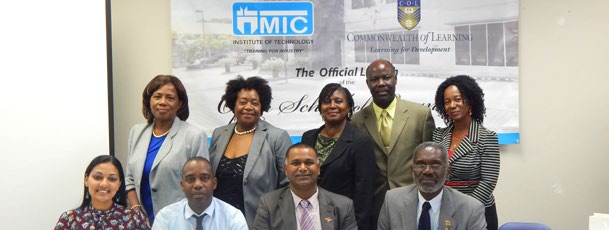
Seated from left to right: Ferida Ramkissoon, MIC; Lyndon Wilson, Tobago House of Assembly;
Anil Ramnarine, MIC; and Reynold John, MIC
Back row from left to right: Betty Joseph, MIC; Marcia Roper, MIC; Lystra Sampson Ovid, COL;
Ian McIntosh, MIC; and Jean Nichols, MIC
Staff Announcements
COL welcomes Dr K Balasubramanian (Bala) as Vice President. Dr Bala, who assumed the Vice President role on 16 October 2015, came to COL as Education Specialist for Agriculture and Livelihoods in 2009, bringing with him vast experience in senior roles in international development as well as in the university, government and non-governmental sectors.
COL wishes to acknowledge former Vice President, Mr Vis Naidoo for his contributions to COL and the development of its 2015-2021 Strategic Plan. Mr Naidoo served as Vice President from 2012-2015 and previously served for five years as Education Specialist for Educational Technology Policy and Planning.
COL also welcomes Mr Roy Thorpe-Dorward as Communications Manager. Mr Thorpe-Dorward joins COL from his previous post as Director, Public Affairs at Fraser Health Authority, British Columbia with over 20 years of experience in media relations and corporate communications.
COL President delivers keynote at DEASA annual conference
COL President Professor Asha Kanwar delivered the keynote address at the annual Distance Education Association of Southern Africa (DEASA) conference hosted by the University of Swaziland on 18 September 2015. Her keynote, Widening Access to Education in the Commonwealth: What Have We Learned? highlighted DEASA’s role in the evolution of open and distance learning and offered four lessons learned: Strengthen systems, conduct robust research, embrace openness and promote ODL for development.
Online Course on Open Educational Resources
COL released a two-hour course Understanding Open Educational Resources to address the problem of inadequate understanding of OER and open licenses. This online course is also available in CD format for learners who do not have Internet access. At the end of the course, participants can print a certificate of completion. The course can be accessed at COL’s Technology-Enabled Learning Lounge: http://tell.colvee.org
NAMCOL scoops World Summit Award 2015
The Namibian College of Open Learning (NAMCOL) was awarded a 2015 World Summit Award for digital creativity and innovation that has social impact for its Notesmaster Namibia: Open Education Resources. The NAMCOL Notesmaster initiative brings new technologies that foster a collaborative approach to digital
content development, allowing teachers in Namibia to access relevant, good-quality digital resources and integrate them into classrooms.
University Grants Commission of Bangladesh visit
 Forging stronger ties and sharing experiences from the world of higher education and open and distance learning was the agenda for the day as COL hosted a delegation of 11 representatives from the University Grants Commission (UGC) of Bangladesh in August.
Forging stronger ties and sharing experiences from the world of higher education and open and distance learning was the agenda for the day as COL hosted a delegation of 11 representatives from the University Grants Commission (UGC) of Bangladesh in August.
The delegates, led by Professor Dr Mohammad Mohabbat Khan, highlighted the sharp increase in demand for higher education across Bangladesh and the pressing need to advance a comprehensive framework for teachers, students and communities alike.
“Our focus is to create an enabling environment for open and distance learning. Today we can begin a process of building a coalition,” said Dr Godson Gatsha, COL’s Education Specialist for Higher Education.
The day included presentations from COL’s education specialists, identifying opportunities and laying the foundations for future collaboration between COL and UGC Bangladesh.
The workshop served as an important learning experience for both COL and UGC Bangladesh, with Professor Dr Khan concluding: “small steps will lead to bigger things.”
Table banking picking up in Tanzania and Ghana
COL’s Lifelong Learning for Farmers (L3F) initiative introduces financial literacy to farm families and communities and encourages them to integrate table banking into their activities. Table banking is a group funding strategy where members of a particular group meet regularly, place their savings, loan repayments and other contributions on the table, and then borrow long- or short-term loans as needed.
In the Global Affairs Canada supported L3F projects in Tanzania and Ghana, table banking activities and learning have become core activities. L3F partners from Kenya, Uganda, Tanzania, Ghana and Mauritius visited one such group as well as a Savings and Credit Cooperative (SACCO) in Turiani, Tanzania. The SACCO manager reported that the performance of the table banking groups has been exceptional. They borrow mostly for productive purposes in agriculture and livestock and the repayment rates to the SACCO from the groups are very high.
In Ghana, a COL education specialist met three groups started by the General Agricultural Workers’ Union of Trade Union Congress (GAWU), Ghana near Tamale. These groups have inspired the formation of even more village groups. During the group meetings, members go through a learning process and then the financial
transactions start. Each member is expected to contribute a minimum amount and is also expected to contribute to a social welfare fund that goes to village development.
The education specialist learned that the groups are facing challenges in depositing and transacting with formal financial institutions. The contributions are therefore kept in a steel box with three keys kept by three of the women members of the group. All three women have to come together to open the cash box. Based on the
capital accumulated, a certain portion is loaned to members for agriculture, livestock, and education and health purposes. GAWU and COL are working with the groups to improve the relationship with financial institutions.
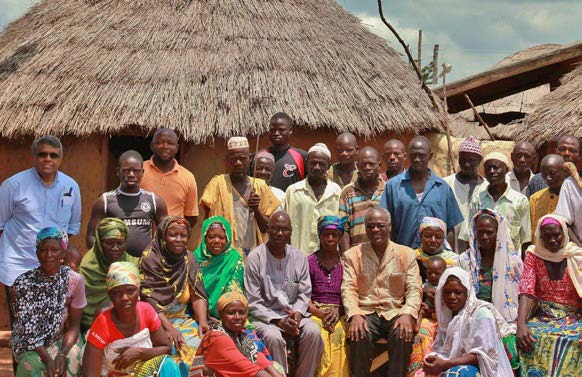
The L3F table banking groups near Tamale, Ghana have experienced
some challenges working with formal financial institutions.
Belize COMOSA Conference
The first Regional Conference on Open Schooling held 10- 12 August in Belize was testament to what a small group of dedicated people can create with the right motivation, said COL Education Specialist Frances Ferreira. The conference, facilitated by the Commonwealth Open Schooling Association (COMOSA) Canada-Caribbean Chapter, attracted a wide range of excellent keynote speakers and presenters who provided a range of interesting perspectives on the conference theme: Innovative schooling: transforming pedagogy, increasing access, to ensure learning.
“Having such high-profile speakers made a tremendous difference,” said Ferreira. “They went out of their way to share their passion for innovation in education with an audience that was hungry to hear what they had to say.”
Students had an opportunity to share their stories and Ferreira said it was clear that those from the open school faced significant personal challenges, including teenage pregnancy, being victims of violence, poverty and disabilities.
“For those students it was not just technology that was responsible for their success, it was their personal ambition, the supportive environment and teachers who believed in them,” Ferreira said.
COL addresses sustainable e-learning at 26th ICDE World Conference
The 26th International Council for Open and Distance Education (ICDE) World Conference (14-16 October 2015) brought together experts, academics and practitioners from around the globe to address the theme of “growing capacities for sustainable distance e-learning provision.”
Asked to offer views on the current distance education landscape, panelists, including COL President & CEO Professor Asha Kanwar , Professor Tolly Mbwette
of the Open University of Tanzania and Professor Alan Tait of Open University, UK, identified key trends and opportunities that can be leveraged by higher education
institutions. Professor Kanwar gave examples of COL’s work on MOOCs for Development, which harness appropriate technologies and use blended approaches to meet the needs of learners in the developing world context.
The conference was followed by a High-Level Policy Forum organised by ICDE, UNESCO, COL and the Open Education Consortium (OEC). The forum asked global
leaders and decision makers to identify concrete actions and strategies for achieving affordable, quality and equitable higher education for all by 2030. Common themes that emerged from discussions included the need for stronger funding, better frameworks for accreditation and qualifications, improvements to infrastructure, capacity and quality, more collaboration and resource sharing, as well as the need for stronger advocacy around open and distance learning (ODL) and open educational resources (OER).
Building on the work of previous summits, the forum resulted in the establishment of preliminary action plans for each region of the world aimed at leveraging higher
education to help achieve sustainable development worldwide.
“Meeting the sustainable development goals requires real investment and innovation in higher education; business as usual will not produce the breakthroughs in
social and economic development the world needs,” said Gard Titlestad, Secretary General of ICDE.
In her presentation, Professor Kanwar said that open and distance learning will be a key driver in this kind of innovation. “Open and distance learning can make a real
difference to the wellbeing and livelihoods of citizens and contribute significantly to meeting the development goals of nations as demonstrated in work throughout the
Commonwealth,” she said.
Full panel discussion available at https://www.youtube.com/watch?v=arSCgsYh5cM
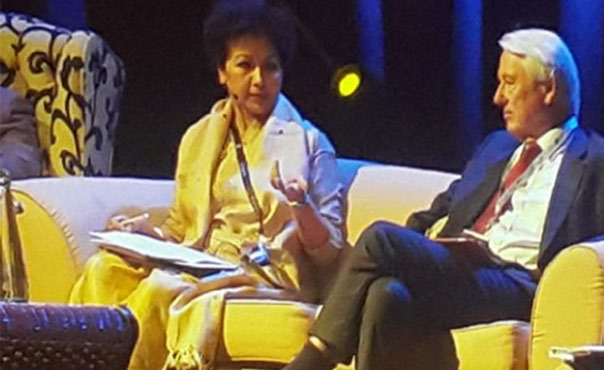
Professor Asha Kanwar, with Professor Alan Tait
at the 26th ICDE World Conference Panel.
At the heart of it: Supporting distance learners in emergency and conflict zones
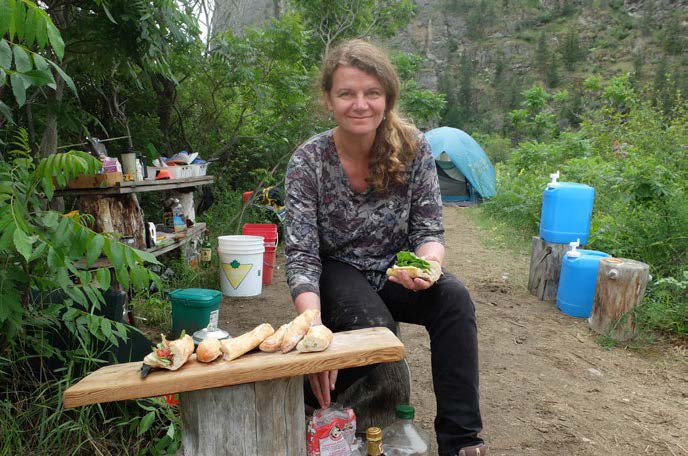 The sound of gunfire, shells exploding nearby in the night, an urgent change of location, armoured vehicles and flak jackets, blackout curtains and no power: these are all part of the reality faced by distance learners working in emergency and conflict zones. Their work brings them to the heart of human struggles and hardship. COL’s work supporting them as distance learners brings “heart” to the role of e-coaching.
The sound of gunfire, shells exploding nearby in the night, an urgent change of location, armoured vehicles and flak jackets, blackout curtains and no power: these are all part of the reality faced by distance learners working in emergency and conflict zones. Their work brings them to the heart of human struggles and hardship. COL’s work supporting them as distance learners brings “heart” to the role of e-coaching.
COL helps to support distance learners in emergency and conflict zones through eLearning for International Organisations (eLIO). The programme specializes in providing the “human touch” in its course offerings and has a cadre of more than 50 e-coaches who have worked with over 8,500 learners in 160 countries to offer
individualised and customised support.
A recent example is a nine-month online program management course delivered for the UN Refugee Agency (UNHCR), which culminated in a five-day face-to-face workshop. Catherine Dunlop, an eLIO e-coach, had the opportunity to attend the workshop, meet the learners and hear their stories. Over and over, they emphasised that the support and encouragement of their e-coach was instrumental in motivating them to keep going and make the most of the course.
Three key themes emerged when supporting distance learners in emergency and conflict zones:
- E-coaching is more than sending reminders and doing marking; it is about connecting with individual learners and understanding their unique context.
- Deadlines sometimes need to be “lifelines”; a flexible approach will help learners to pull through a difficult patch when a rigid approach would leave the learner behind.
- E-coaching with heart includes empathy; it helps to “be there” with the learner, no matter how far away they are, to celebrate and commiserate while they work at the heart of difficult struggles.
“Millions of lives are touched by the work of these distance learners in emergency and conflict zones. As e-coaches with eLIO, we are committed to the human-to-human connection with learners so that many more people can benefit from their important work,” said Dunlop.
Fiji looks to Aptus as a robust, flexible learning solution
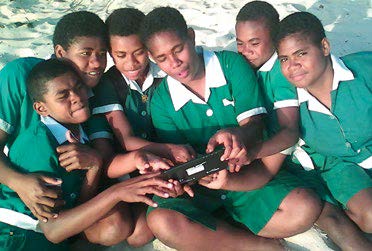 Despite the proliferation of online educational resources and networks, persistent barriers to Internet access can render these resources inaccessible. Fiji knows this well. As an archipelago of over 300 remote Pacific islands, developing and maintaining effective Internet service is complex and costly. While access to online resources isn’t essential, it is discouraging for both teachers and learners to miss out on opportunities to access quality materials both for professional development and classroom use.
Despite the proliferation of online educational resources and networks, persistent barriers to Internet access can render these resources inaccessible. Fiji knows this well. As an archipelago of over 300 remote Pacific islands, developing and maintaining effective Internet service is complex and costly. While access to online resources isn’t essential, it is discouraging for both teachers and learners to miss out on opportunities to access quality materials both for professional development and classroom use.
Education Specialist Mr Matai Tagicaki with Fiji’s Higher Education Commission has been working with teachers and learners across Fiji to find innovative ways to share knowledge and resources through open source platforms such as Moodle; however, connectivity remains a challenge. Tagicaki believes Aptus is the game-changer.
Aptus is a low-cost, offline ‘virtual classroom’ developed by COL. Since learning about Aptus, Tagicaki has demonstrated it as an effective solution across a range of learning environments in Fiji, including early childhood, secondary and higher education scenarios.
In trials at local institutions, Aptus has proven to be a robust solution that is easily customisable to diverse needs. It is currently being explored as a platform for open educational resources (OER) in Fiji’s secondary schools, and as a ‘library-on-the-go’ to serve rural students enrolled in distance learning programmes at Fiji National University.
Tagicaki and his colleagues in Fiji continue to explore how Aptus can be used to address the unique challenges faced by local education institutions and practitioners working in an environment with limited or no Internet access. The feedback and demand for Aptus from school administrators and educators has been overwhelming, Tagicaki reports.
“One school teacher from an outer island school had tears in her eyes while expressing how much the video content on Aptus will help her with otherwise difficult-to-teach lessons,” he said.
Commonwealth Executive MBA/MPA meetings in Botswana
The 26th Academic Board and 11th Executive Governing Board meetings of the Commonwealth Executive Master of Business Administration and Public Administration (CEMBA/CEMPA) Programme were held in Gaborone, Botswana on 19 and 20 October 2015.
Representatives of all participating institutions from 11 countries (Bangladesh, Botswana, Cayman Islands, Guyana, Ghana, Jamaica, Malaysia, Mauritius, Nigeria, Pakistan and Sri Lanka) were present at the meetings, which were held to strengthen linkages among consortium members and to improve the academic quality of CEMBA/CEMPA.
The meetings were opened by Dr Unity Dow, Minister of Education and Skills Development, Botswana, who welcomed delegates and thanked the consortium for
accepting Botswana College of Distance and Open Learning (BOCODOL) as a member. She further commended COL for its unwavering support for the development of open and distance learning (ODL) in Botswana.
COL President & CEO Professor Asha Kawar thanked the Minister for officiating and expressed her appreciation of Botswana’s collaboration with COL over the years. The Minister said she was impressed by what open universities across the Commonwealth were offering, and that she was pleased that BOCODOL had joined a consortium critical to its transformation into an open university.
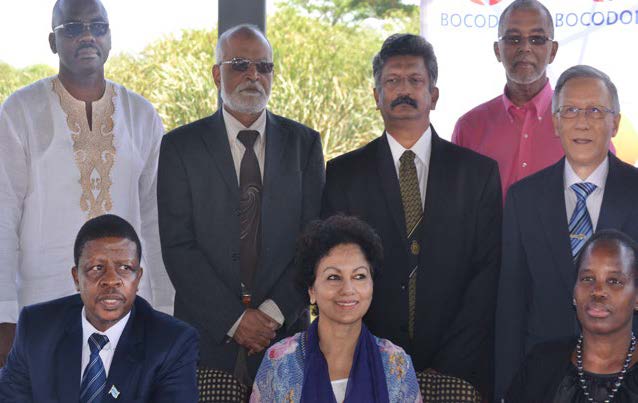
Seated from left to right:
Dr Daniel Tau, Professor Asha Kanwar and
Dr Unity Dow, Minister of Education and Skills Development.
Back row from left:
Professor William Otoo Ellis, Professor Roshun Dhurbarylall,
Professor Anbahan Ariadurai, Professor Roy Bodden
and Professor Dato’ Dr. Ho Sinn Chye
TOP 5…
Tips for Teaching the Practice of ‘Open”
The notion of ‘openness’ in education continues to evolve as new opportunities and frameworks for open sharing and collaboration gain traction among education institutions. Open access, open educational resources (OER), and massive open online courses (MOOC) all represent an ongoing shift away from historical approaches to teaching and learning that opens doors to rethinking education in more equitable, accessible terms. As discussions continue, practitioners are evolving new methods of ‘doing’ openness in the classroom. Speaking at an International Open Access Week panel discussion in Vancouver, BC hosted by SFU and UBC, Dr Juan Pablo Alperin shared his five tips for ‘teaching the practice of open.’
-
Make all readings open access: Practice what you preach by making use of available open access publications as course readings wherever possible.
-
Have students annotate them openly: Encourage students to use public forums and open annotation tools such as Hypothes.is to respond to published material.
-
Have students publish all their work: Encourage students to publish and share their own work openly using freely available blogging and website publishing tools such as WordPress.
-
Give students feedback through annotations: Respond and share feedback on student work openly via comments and open annotations.
-
Have students openly review each other: Encourage students to share feedback with each other via comments and open annotaions.
Source: Openness in Higher Education, by Juan Pablo Alperin (@juancommander on Twitter)
View the complete presentation at https://speakerdeck.com/jalperin
FOCUS
Tablets for Learning: What’s the Evidence
Reviews show that tablets can be effective learning tools when used with a student-centered approach Tablet computers are being introduced to support learning in classrooms around the world, but are they effective? Supported by COL, Dr Tamim from Zayed University, and Dr Borokhovski and Dr Bernard from Concordia University conducted two systematic reviews to identify prominent tablet initiatives and investigate the impact of using tablets for teaching and learning as reflected by
empirical research.
The first review1 examined government-supported large-scale tablet initiatives in order to understand their origins, underlying principles, financial and organisational
models and expected outcomes. Major findings reflected the increasing penetration of information and communications technologies (ICT) globally. The literature search, which led to 142 documents, showed that governments have made large financial investments in tablets to reform educational systems, make K-12 classrooms more engaging, and reach children in isolated rural areas.
The review identified 11 countries that have launched such large-scale projects. Documents showed that the majority of the initiatives were launched in a hasty and
uncalculated manner, similar to the uncritical enthusiasm that previously surrounded the one-laptop-per-child initiatives. More interestingly, coun


